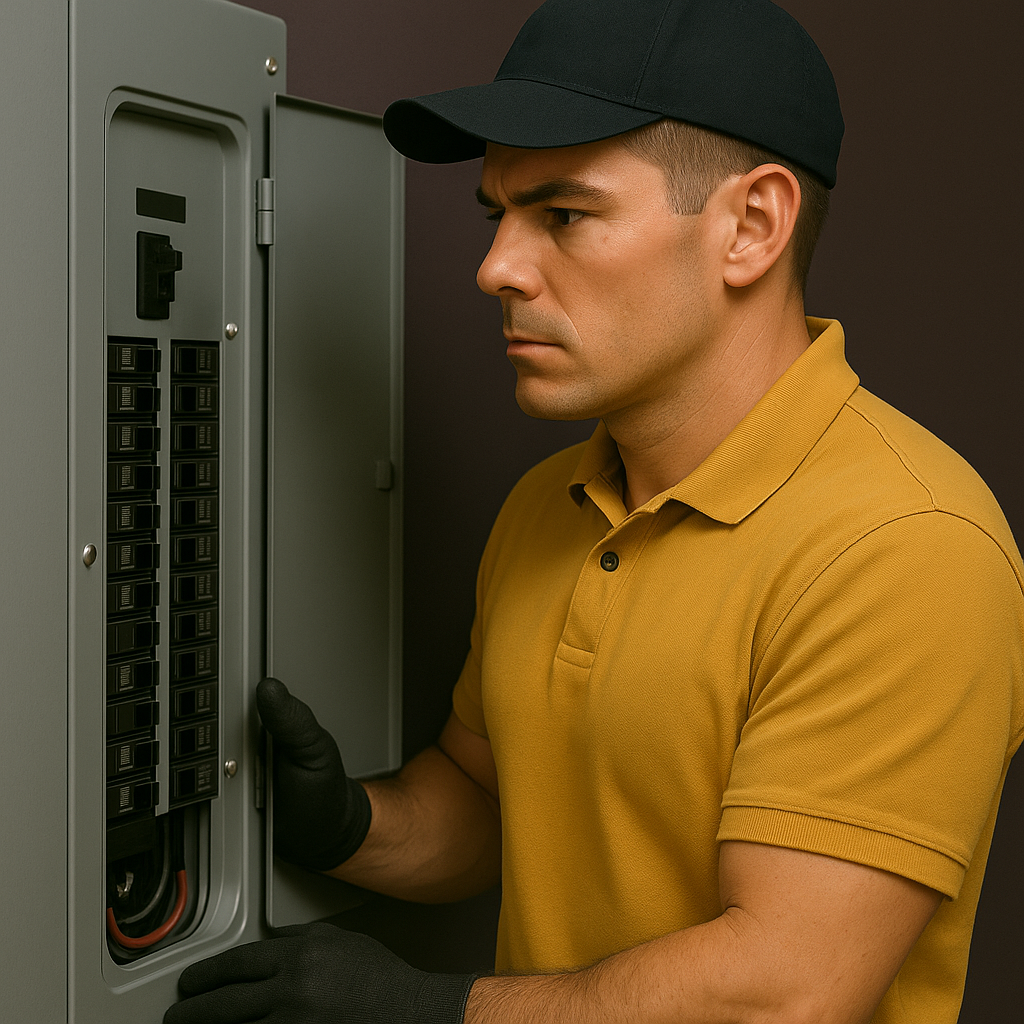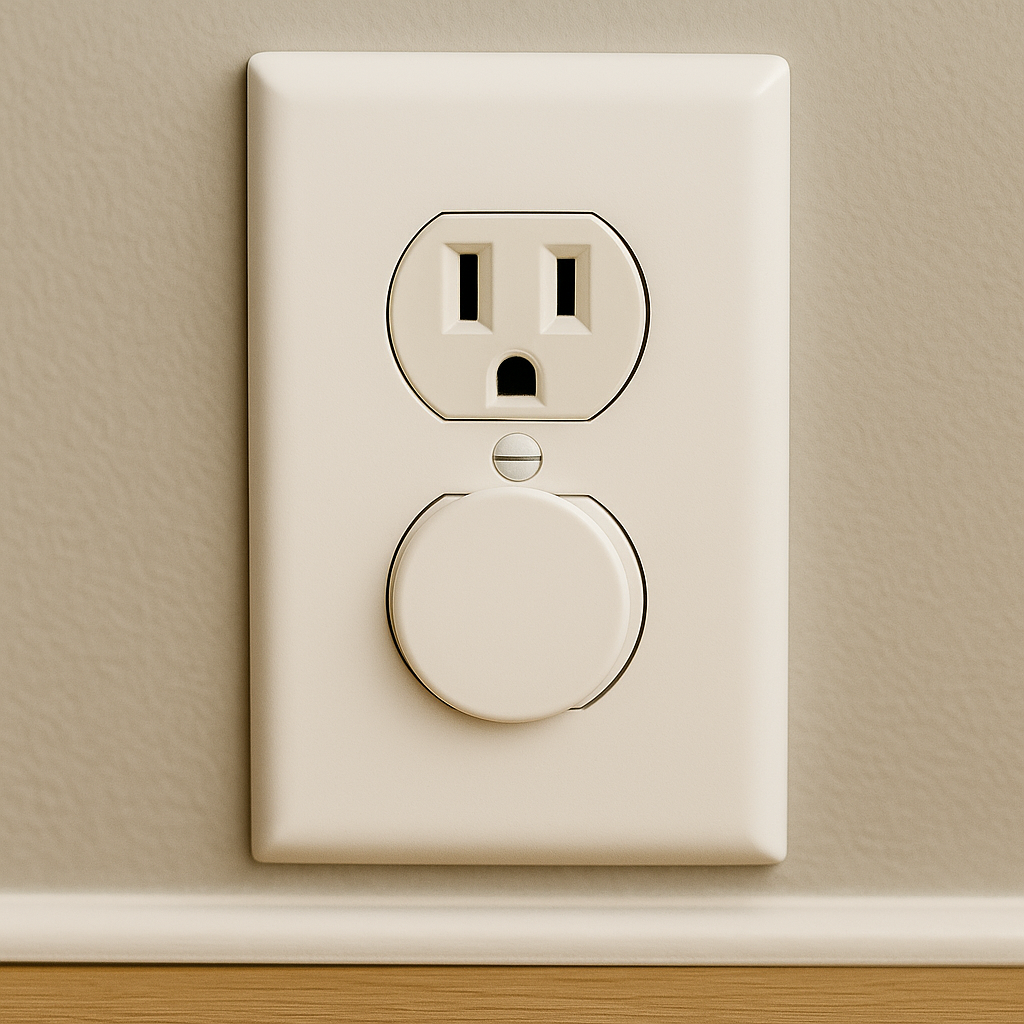Why Your Lights Flicker (And When to Call an Electrician)
Introduction
There’s nothing more unsettling than settling in for a quiet evening only to have your lights begin to flicker—sometimes barely noticeable, other times jarring enough to cast dancing shadows across your walls. While an occasional blink may simply signal a loose bulb or the startup surge of a heavy appliance like an air conditioner, persistent or widespread flicker often points to more serious electrical concerns that can compromise both comfort and safety in your home. In this comprehensive guide, we’ll dive deep into the mechanics behind flickering lights—examining everything from corroded socket contacts and overloaded circuits to utility-side voltage dips and aging wiring systems. You’ll learn practical, step-by-step diagnostic techniques that anyone can perform safely, discover when simple DIY fixes are sufficient, and understand the red-flag symptoms—buzzing outlets, scorch marks, repeated breaker trips—that mean it’s time to call in a licensed professional. By the end of this article, you’ll not only know how to restore stable, reliable lighting but also which warning signs to heed to prevent potential fire hazards and ensure your home’s electrical system remains up to code.
Table of Contents
- Common Causes of Flickering Lights
- How to Diagnose Flicker Issues
- DIY Repairs and Precautions
- When to Call an Electrician
- Conclusion
- FAQs
Common Causes of Flickering Lights
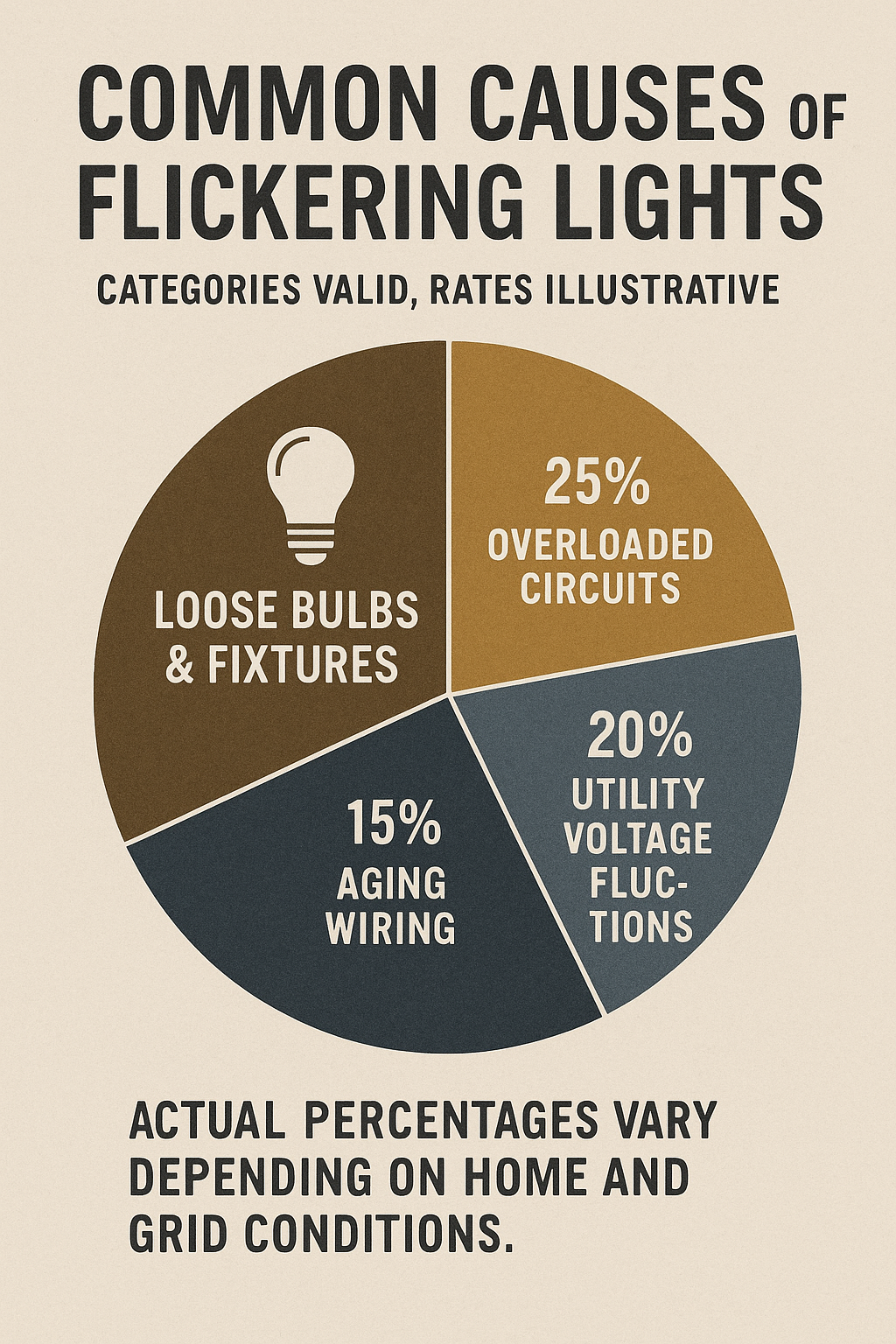
Loose or Faulty Bulbs and Fixtures
Often the simplest fix hides in plain sight: a bulb that’s not screwed in fully or a corroded contact inside the socket. Over time, vibration and heat cycles can loosen connections, causing intermittent contact and the familiar blink-blink you see when the filament shifts. Checking and tightening bulbs—and replacing worn sockets—can eliminate many isolated flickers.
Overloaded Circuits
Modern homes bristle with high-draw appliances—air conditioners, space heaters, hair dryers—that demand sudden surges of current. When two or more such devices share a circuit, the instantaneous power spike can momentarily drop voltage to your lights, causing them to dim or flicker until the motor stabilizes. Redistributing loads across separate circuits often cures this problem.
Voltage Fluctuations from Utilities
Not all flicker originates in your walls. Utility companies routinely switch lines or respond to faults on the grid, creating momentary dips or spikes in voltage that ripple through entire neighborhoods. If your lights blink in sync with your neighbors’, you’re witnessing a transient grid event—a reminder that sometimes the solution lies upstream.
Aging or Damaged Wiring
Homes built before modern electrical codes may still rely on cloth-insulated wiring or aluminum conductors that degrade over decades. Loose connections in junction boxes, corroded terminals in your breaker panel, or chewed-through conductors can all produce erratic voltage delivery. These conditions not only flicker lights but also pose serious fire hazards.
See: How to Fix Flickering Lights in Your House
How to Diagnose Flicker Issues
Begin by noting where and when the flicker occurs. If only one fixture blinks, power down the circuit and inspect the socket for wear or corrosion. If multiple lights dim when you start an appliance, you likely have an overloaded circuit—try moving the device to a different outlet. To rule out utility-side fluctuations, ask neighbors whether they experienced the same blink; simultaneous flicker across homes points to the grid. Throughout your inspection, always switch off power at the breaker panel before handling fixtures, and wear rubber-soled shoes for added insulation.
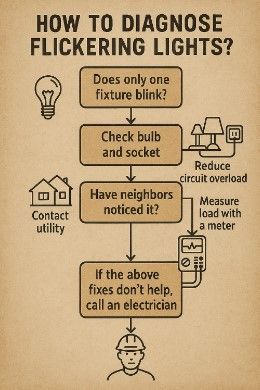
See:
Why do my lights flicker when I plug in certain appliances to outlets on the same circuit?
See:
Lights are flickering and dimming
DIY Repairs and Precautions
When you identify a loose bulb, cut power, allow it to cool, and tighten it firmly. Replace cracked fixtures or sockets with code-approved models, and consider migrating heavy appliances to dedicated circuits to reduce load. However, never ignore warning signs like buzzing sounds, scorch marks, or frequent breaker trips—these demand immediate professional attention. Handling live wiring or corroded connections without proper training can escalate minor issues into major hazards.
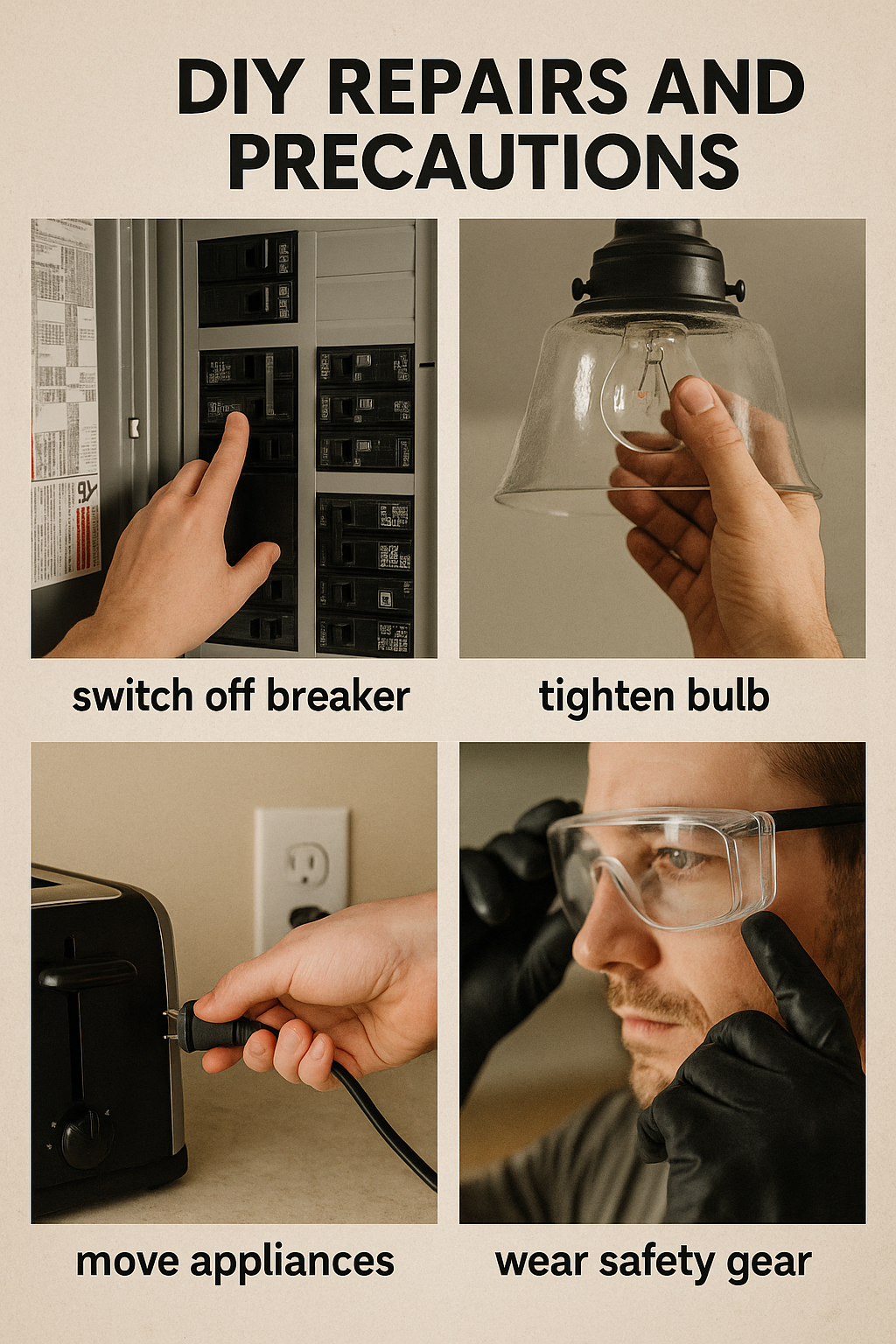
When to Call an Electrician
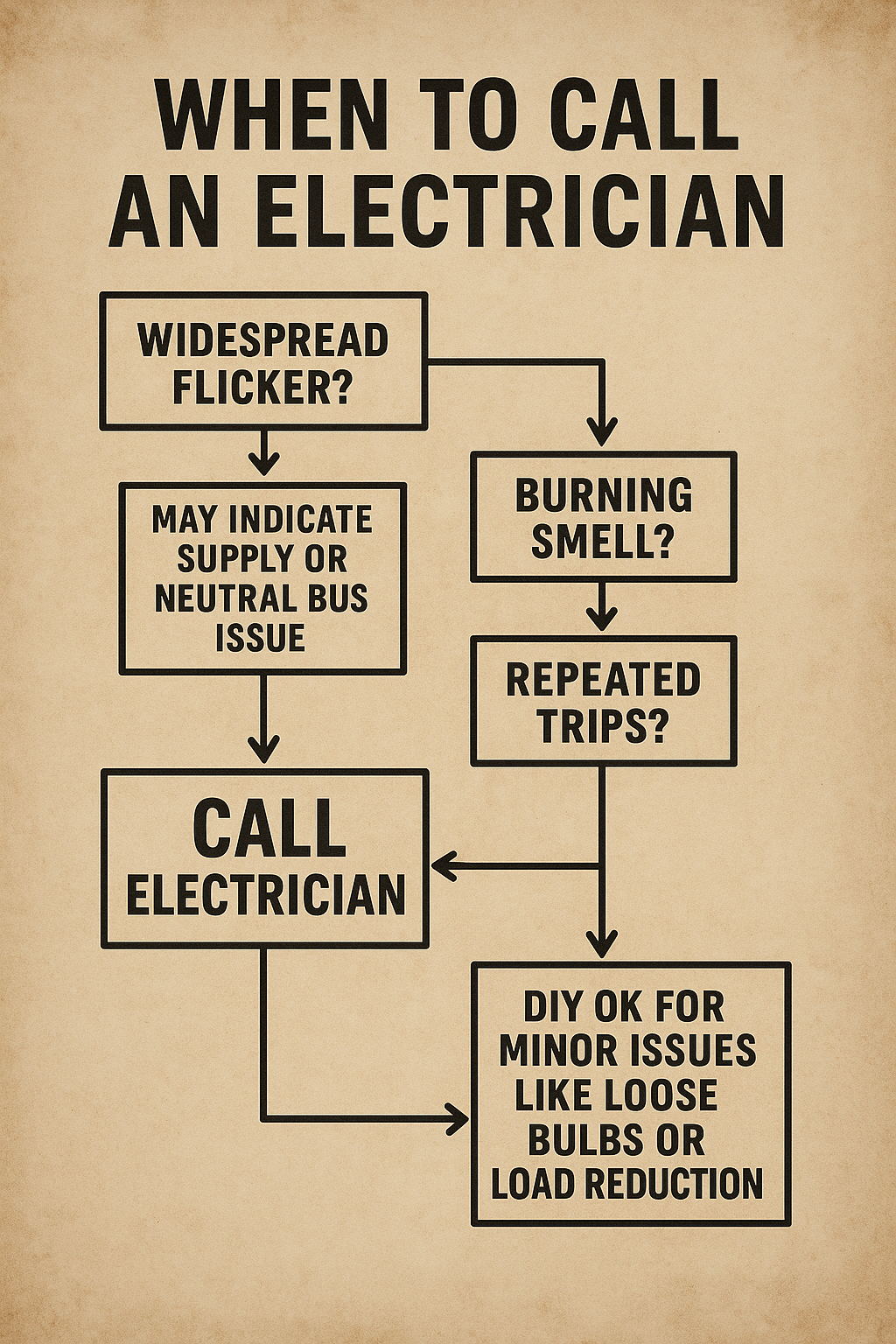
You should enlist a licensed electrician from C.A.S.E. Contracting Inc. if you encounter any of the following:
Widespread Flicker: Multiple fixtures across different rooms blink simultaneously.
Warning Signs: You detect burning odors, hear buzzing, or see scorch marks at outlets, switches, or the panel.
Persistent Breaker Trips: Circuits repeatedly trip after resetting, even under minimal load.
Outdated Wiring: Your home uses cloth-insulated or aluminum wiring, or an old fuse box.
Panel Abnormalities: Loose breakers, warm service panels, rust, or corrosion inside the panel.
Our licensed and insured team has served Grass Valley, Nevada City, North Auburn, Truckee, and Downieville, CA, since 1984, handling everything from panel upgrades and new-construction wiring to generator installations and comprehensive troubleshooting. When you’re ready for a thorough diagnosis and safe, code-compliant repairs, call us at (530) 277-0917 or schedule service via our website.
Conclusion
Flickering lights are more than a mere annoyance—they’re often your home’s way of signaling that something in the electrical system isn’t performing as it should. You’ve learned how to pinpoint whether the culprit is as simple as a loose bulb or fixture, an overloaded circuit drawing too much current, a momentary utility-side voltage dip, or the telltale signs of aging, compromised wiring. Armed with safe, step-by-step troubleshooting techniques—powering down circuits before inspection, redistributing heavy loads, and replacing worn sockets—you can often restore steady illumination on your own. Yet when you encounter persistent dimming, buzzing outlets, scorch marks, or breakers that refuse to stay on, those are unmistakable red flags that DIY remedies have run their course. At that juncture, it’s time to turn to seasoned professionals.
Since 1984, we at C.A.S.E. Contracting Inc. have been helping homeowners across Grass Valley, Nevada City, North Auburn, Truckee, and Downieville, CA, resolve complex electrical issues with licensed, insured service. Whether you need a comprehensive wiring inspection, panel upgrade, or emergency troubleshooting, our family-owned team is ready to respond Monday through Friday from 7 am to 10 pm. Call us at (530) 277-0917, email casecontractinginc@gmail.com, or visit our website’s contact form to schedule service. By combining your newfound troubleshooting skills with our professional expertise, you’ll ensure your home’s lighting—and your family’s safety—never flickers again.
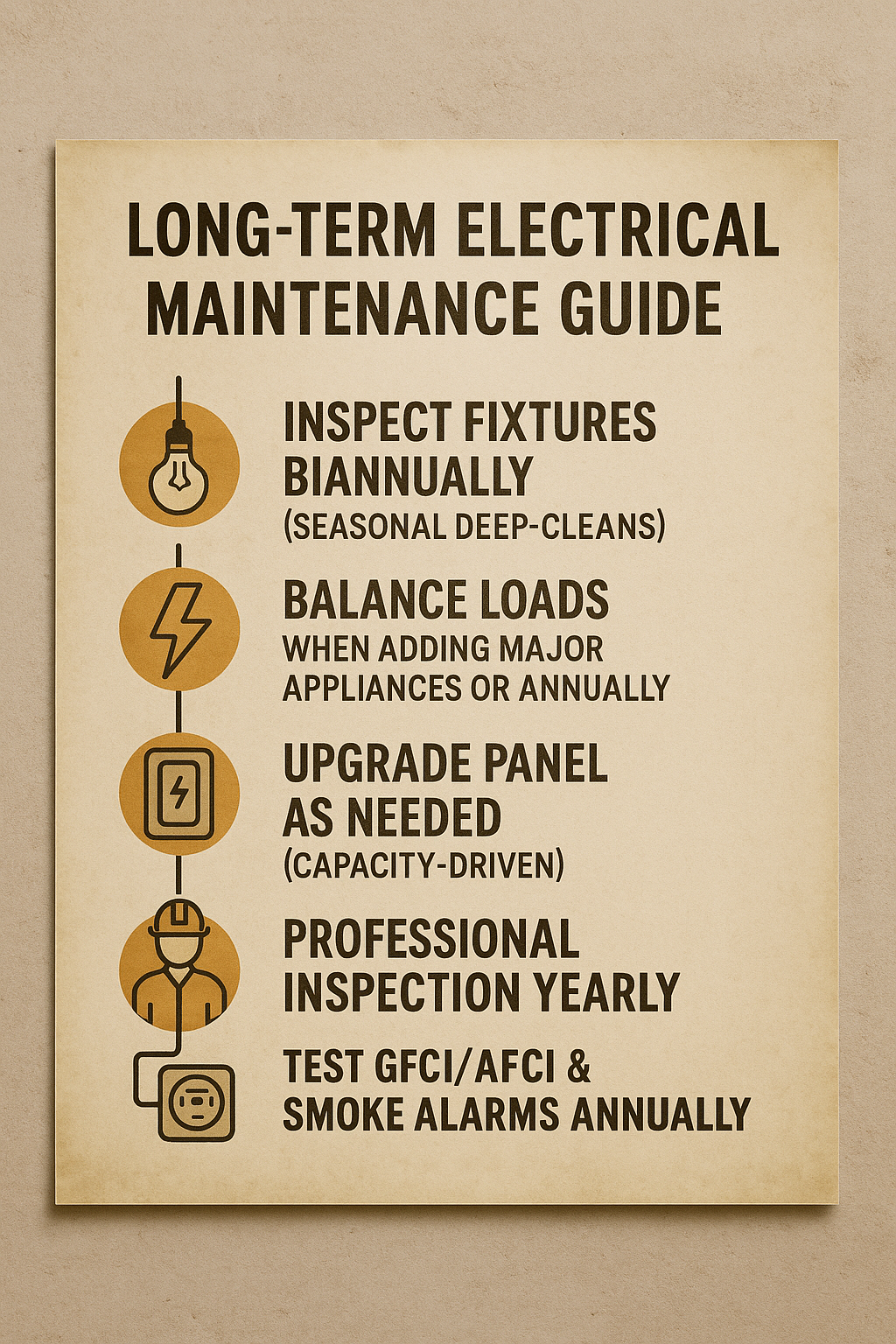
FAQs
1. Are flickering lights harmful?
Occasional flicker from a loose bulb is harmless, but frequent or widespread flicker—especially with buzzing or burning smells—can indicate fire-risk wiring faults that require immediate professional inspection.
2. Can I fix flickering myself?
Simple fixes like tightening bulbs or moving heavy appliances to different outlets are safe DIY tasks. However, don’t attempt repairs involving live wiring, panel connections, or damaged insulation—those require a licensed electrician.
3. Why do my lights flicker when my AC kicks on?
Air conditioners draw a large inrush current at startup, causing a temporary voltage drop on the circuit that can dim or flicker lights until the compressor stabilizes.
4. How do I know if the flicker is utility-side?
If your lights blink at the same time as your neighbors’ and no heavy appliance is running, the issue likely stems from grid switching or a momentary line fault. If it happens repeatedly, report it to your utility provider.
5. What should I inspect before calling an electrician?
Check for loose bulbs, damaged fixtures, overloaded circuits, and note any warning signs—buzzing, trips, scorch marks. Document when and where flicker occurs to help your electrician diagnose more efficiently.
6. How often should I schedule electrical maintenance?
We recommend an annual inspection to ensure breakers, wiring, and panels remain in optimal condition. Regular maintenance helps catch minor issues before they become serious hazards.

